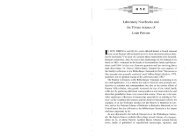Ideas for a Philosophy of Nature
Ideas for a Philosophy of Nature
Ideas for a Philosophy of Nature
You also want an ePaper? Increase the reach of your titles
YUMPU automatically turns print PDFs into web optimized ePapers that Google loves.
18 <strong>Ideas</strong> <strong>for</strong> a <strong>Philosophy</strong> <strong>of</strong>N au;..then it is presupposed as something that exists <strong>for</strong> itself and independently <strong>of</strong> its <strong>for</strong>ces. So would these <strong>for</strong>ces be merely accidental to itBecause matter is at hand outside you, so also it must owe its <strong>for</strong>ces to aexternal cause. Are they, as it were, as some Newtonians say, implantedin it by a higher hand? But you have no conception <strong>of</strong> inftuences by which <strong>for</strong>ces are implanted. You know only how matter, i.e.<strong>for</strong>ce itself, works against <strong>for</strong>ce; and how effects can be produced 0something which originally is not <strong>for</strong>ce, we have no conception at allOne may say something <strong>of</strong> the sort; it can pass from mouth to mouthbut never yet has it actually entered any human head, because nhuman head can think any such thing. There<strong>for</strong>e, you cannot conceivematter at all without <strong>for</strong>ce.Further: Those <strong>for</strong>ces are <strong>for</strong>ces <strong>of</strong> attraction and repulsion. "Attractionand repulsion" -do these, then, take place in empty space?Do they not themselves already presuppose occupied space, that ismatter? So you must admit that neither <strong>for</strong>ces without matter nomatter without <strong>for</strong>ces can be conceived. But now matter is the finsubstratum <strong>of</strong> your knowledge, beyond which you cannot go; and ayou cannot explain those <strong>for</strong>ces from the matter, so you cannot explaithem at all empirically, that is, by something outside yourself, as surelyyou must do according to your system.Irrespective <strong>of</strong> this it is asked in philosophy how matter is possibiexternal to us, thus also, how those <strong>for</strong>ces are possible outside usOne can abjure all philosophizing (would to God those who do nounderstand it would be pleased to do so), but if you do wish t,philosophize, you cannot neglect those questions. Now, however, youcan in no way make intelligible what a <strong>for</strong>ce might be independent 0you. For <strong>for</strong>ce as such makes itself known only to your feeling. Yefeeling alone gives you no objective concepts. At the same time yomake objective use <strong>of</strong> those <strong>for</strong>ces. For you explain the movement 0celestial bodies - universal gravitation - by <strong>for</strong>ces<strong>of</strong> attraction andmaintain that in this explanation you have an absolute principle 0these phenomena. In your system, however, the <strong>for</strong>ce <strong>of</strong> attracuoranks as nothing more or less than a physical cause. For as matterindependent <strong>of</strong> you exists outside you, so likewise you can only knowwhat <strong>for</strong>ces belong to it through experience. As physical ground 0explanation, however, the <strong>for</strong>ce <strong>of</strong> attraction is nothing more andnothing less than an occult quality. All the same, let us first seewhether empirical principles can be adequate at all to explain thepossibility <strong>of</strong> a world system. The question answers itself in the negative;<strong>for</strong> the ultimate knowledge from experience is this, that a universeexists; this proposition is the limit <strong>of</strong> experience itself. Or rather,that a universe exists is itself only an idea. Even less, there<strong>for</strong>e, can theI Introduction 19rsal equilibrium <strong>of</strong> world <strong>for</strong>ces be anything that you could haveted from experience. For you could not even extract this ideaxperience <strong>for</strong> the individual system if it is everywhere idea; butnsferred to the whole only by analogical inferences; such inferhowever,give no more than probability. Whereas ideas like thatniversal equilibrium, true in themselves, must <strong>for</strong> that reason bects <strong>of</strong> something, or must be grounded in something, which isbsolute and independent <strong>of</strong>experience.'!rdingly, you would have to admit that this idea itself reachesto a higher region than that <strong>of</strong> mere natural science. Newton,ever wholly abandoned himself to that, and himself still soughte effective cause <strong>of</strong>attraction, saw only too well that he stood at theT <strong>of</strong><strong>Nature</strong> and that here two worlds diverge. Seldom have greatlived at the same time without working from altogetherdifferenttowards the same objective. Whereas Leibniz based the system <strong>of</strong>'ritual world on the pre-established harmony, Newton found the1 <strong>of</strong> a matel'ial world in the equilibrium <strong>of</strong> world <strong>for</strong>ces. But if,I, there is unity in the system <strong>of</strong> our knowledge, and if we everd in uniting the very last extremes <strong>of</strong> that system, we must hopeen here, where Leibniz and Newton diverged, an all-embracingwill at some time find the midpoint round which the universe <strong>of</strong>our>'dge moves-the two worlds between which our knowledge is att still divided; and Leibniz's pre-established harmony and Newystem<strong>of</strong> gravitation still appear as one and the same, or merely asnt aspects <strong>of</strong>one and the same totality. ,6farther. Raw matter, that is, matter ins<strong>of</strong>ar as it is thought <strong>of</strong> asfilling space, is only the firm ground and basis on which the<strong>of</strong> <strong>Nature</strong> is first constructed. Matter has to be something real.hat is real only permits <strong>of</strong> being sensed. How then is sensationle in me? As you say, it is not enough that I should be affectedwithout. There must be something in me which senses, and bethisand what you assume to be outside me no contact is possiT, if this external thing works on me as matter on matter, then IIy react upon this externality (as it were, by repulsive <strong>for</strong>ce), but'on myself. And yet this has to occur, <strong>for</strong> I have to sense, have tohe sensation to consciousness.at you sense <strong>of</strong> matter you call quality, and only ins<strong>of</strong>ar as it has ainate quality is it said to be real <strong>for</strong> you. That it has quality at all'ssary, but that it has this determinate quality appears to you asdeas, like that <strong>of</strong>a universal equilibrium, are only products <strong>of</strong>a creative faculty ins, [First edition.]["and Leibniz's ... one and the same totality" is lacking in the first edition.]



